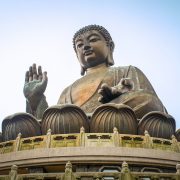With the Nigerian general elections coming up in February 2019, Atiku Abubakar who is the presidential candidate of the People’s Democratic Party (PDP) which is Nigeria’s largest opposition party, announced the inclusion of a “comprehensive blockchain and digital currency policy” in his policy paper.
A bold move which came as a surprise as the country’s current regulatory establishment which is lead by the Central Bank of Nigeria has been unwavering in their over-cautious yet non-hostile approach to cryptocurrencies.
A Break In Traditional Ways:
Abubakar, who previously served as Nigeria’s vice-president between 1999 and 2007, is currently trying to break the current status quo and breath new life into the Nigerian economy as the country is still currently suffering the after-effects of a recession in 2016 plus the global oil price slump which saw the nation’s currency (the Naira) lose around 85% of its original value in less than 2 years.
Traditionally, Nigeria’s regulatory ecosystem has often been painted as one that is conservative, with many banks exercising significant influence over the country’s regulatory processes and decisions. Due to this, authorities have issued numerous warnings and statements against crypto investments, despite the fact that awareness and adoption of bitcoin and other digital currencies have grown significantly over the last few years.
Back in January, Godin Emefiele the CBN governor described BTC investment as a “gamble” which should be regulated. Despite this flagrant masquerading, Nigeria, in fact, has one of Africa’s leading peer-to-peer crypto trading ecosystems with providers such as PundiX launching many successful BTC payment products and services in the nation. 
Atiku seeks to present his vision of job creation on a large scale as a necessary means for aiding in national security issues and is also trying to position himself as leader who is well suited for the 21st century when compared to the 78 year old Muhammadu Buhari who has on numerous occasions been critiqued for his work with the economy.
Atiku had this to say at the launch of his policy plan:
“My mission is to ensure that Nigeria’s economy is responsive to the challenges of the 21st century knowledge economy by keeping with the amazingly dynamic technological pace.”
Could Nigeria See Comprehensive Regulation Of Crypto?
In Atiku’s recently published campaign launch policy document – “Get Nigeria Working Again”, the opposition leader promised that if he were to win the upcoming election, a key strategy of his government will be to marshal in fresh economic growth through the use of blockchain & crypto regulation. According to his policy document, Atiku’s government will oversee the creation of a comprehensive policy on both cryptocurrencies and blockchain tech by means of collaboration between all relevant government offices with the core goal is providing new opportunities for the Nigerian populace as well as raise new revenue paths for the government.
Here is an excerpt from the policy document:
“In harnessing the potentials of the new economy, we shall promote the Production of a comprehensive policy on blockchain technology and crypto-currencies by the relevant government agencies. The terms of this mandate will ensure that these areas are regulated and managed in a way that provides job opportunities as well as income for the government and people of Nigeria. Regulation will provide clarity for informed decision making, in this $278 billion industry that consists of 1,800 currency types.”
This declaration is one of utmost importance, as it goes down in history as the first time that cryptocurrency regulation will be the subject of important political discussion on the African continent. Ultimately, it also means that, if the opposition wins the election next year, the Nigerian market which sits at 177 million people, with many who are financially underprivileged, with a GDP of around $450 billion, will potentially be exposed to cryptocurrency adoption on a country-wide scale which could very put Nigeria at the forefront of global cryptocurrency discussions.
If this were to happen, could Nigeria be the only African country that many other nations on the continent follow in the pursuit of comprehensive crypto adoption and regulation? Let us know your thoughts by commenting below.
Follow CoinBeat on Facebook, Twitter & Telegram
Subscribe to our CoinBeat Newsletter
Submit an article to CoinBeat
View live Marketcap Prices here







Comments